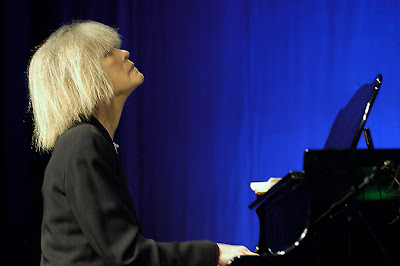 |
| Carla Bley. Photo by Klaus Muempfer |
Carla Bley, la grande dame du jazz, the woman with the signature haircut, the cool witch (as Swiss critic Peter Rüedi called her), is dead. On the scene since the end of the 1950s - her composition “Donkey“ was written in 1958 - Bley has composed and recorded new work constantly. She won several international prizes, was named a Jazz Master by the NEA, and received Honorary Doctorates from the University of Toulouse and the New England Conservatory of Music.
When Lovella May Borg (her birth name) came to New York she must have been an eye-catcher. As a cigarette girl at the famous Birdland she enchanted the young avant-garde pianist Paul Bley, who soon became her husband and encouraged her to start composing. Carla was both muse and respected composer of the young scene, a number of musicians began to record her material. Jimmy Giuffre used “Ictus“ for his album Thesis and Paul Bley’s legendary Barrage (on ESP) consisted entirely of her compositions. In a male-dominated environment Carla Bley became a role model for the upcoming feminist movement, she was cool, beautiful, self-confident and most of all exceptionally talented, something she proved with her composition “Ida Lupino“ (from 1964), which was released on Paul Bley’s Closer album in 1966. In 1964 she was also one of the founders of the Jazz Composers Guild, which wanted to further orchestral avant-garde music. One of her combatants was Michael Mantler, whom she married in 1965 after she was divorced from Paul Bley. With Mantler, she co-led the Jazz Composers’ Orchestra and started the JCOA record label. By this time, Carla Bley was ready to work on a large-scale project of her own. The result was one of the biggest unified compositions jazz has ever produced, the extravagant surreal jazz opera Escalator Over the Hill. The long (nearly two hours) stylistically eclectic work brings together singers and players from all genres - 53 people contributed to the recording, including some of the most productive and original jazz and rock musicians working at the time. Prominent participants were Don Cherry, Roswell Rudd, Jimmy Lyons, Charlie Haden and Gato Barbieri as well as Jack Bruce, John McLaughlin and the very young Linda Ronstadt. The work as a whole celebrates and reformulates rock megalomania, free jazz iconoclasm, and classical sobriety. It’s Bley’s early magnum opus.
Throughout her career Bley has thought of herself as a composer first, which is why she’s always loved writing music for her big bands. She was a master of the musical quote, the collage, and she was able to use irony in her compositions, e.g. in “Spangled Banner Minor and Other Patriotic Songs” from The Carla Bley Band: European Tour 1977, which puts several national anthems through the grinder, beginning with the American one recast as Beethoven’s “Appassionata Sonata“. Here and in many of her works for larger ensembles she mixed elements of the music of composers like Hanns Eisler and Kurt Weill with contemporary modern jazz.
In recent decades, Bley reconciled with smaller formats and her abilities as a pianist, mostly in duos and trios with her life-companion bassist Steve Swallow and saxophonist Andy Sheppard. She’s never considered herself as a virtuoso. “I do the fifty-one Brahms exercises every day,” Bley admitted. “I can’t really tell you what Carla is like”, Steve Swallow once said. “She’s so elusive and ever-changing. She is, however, my hero, and I’ll leave it at that.” It’s this elusiveness that best describes Carla Bley. She was always interested in the process of making music, in new possibilities and new developments.
I saw Carla Bley on the first jazz concert I’ve ever visited - a festival in Freiburg/Germany in 1980, with Chet Baker, Barbara Thompson and John Abercrombie (among others). I was flabbergasted by her charisma and the sheer beauty of the music. But I also remember how angry she was because the Americans had elected Ronald Reagan as President. “Ida Lupino“, with its inner voices and canonic echoes, has remained one of my favorite jazz compositions, Escalator Over The Hill will always be in the canon of avant-garde music. Her death is a terrible loss.
Watch her and Steve Swallow playing “Lawns“. It’s as beautiful as Carla Bley herself:













1 comments:
Very very sad news. What a great icon of jazz and music in general. I cannot sufficiently emphasise what she has meant for my appreciation of music, whether with her great jazz opera "Escalator Over The Hill" to her duo (and trio) albums with Steve Swallow (and Andy Sheppard), and all the rest .... The skill, the musical language, the fresh creativity, the fun in making music itself, her great generosity of thought to other musicians. A great loss for jazz, and a moment to put all these great albums back on my turntable.
Post a Comment